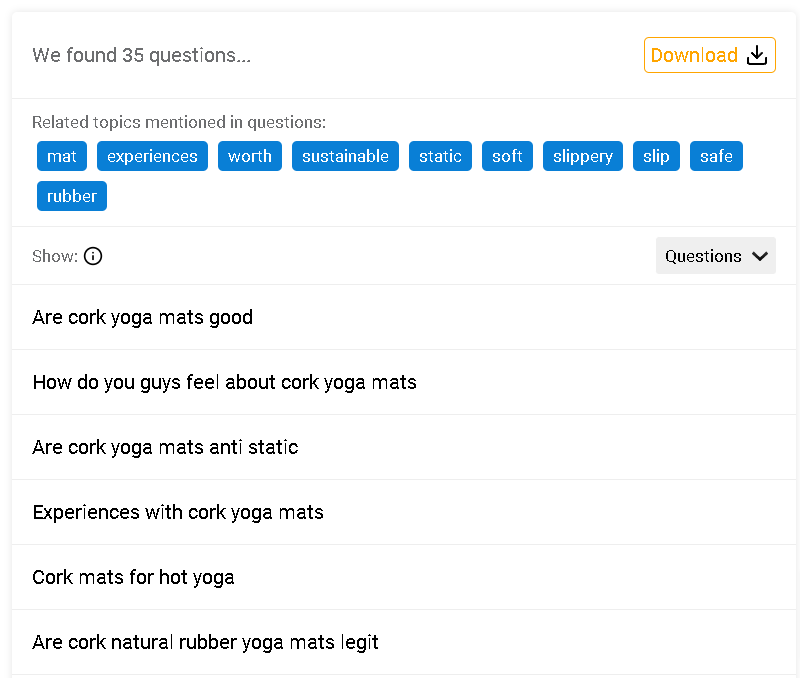7 free blog topic research tools for great content ideas
Whether you're just starting or blogging for years, it's good to have a few tools in your toolbox. If you use them right, these tools can help you find new topics for your blog posts, optimize the site for search engines and build up your brand. Here are seven free blog topic research tools that will help:
We’ve only included tools that give you free access to content ideas. 😎
1. Search Response
Search Response is a free keyword research tool that gives you suggestions for blog topics based on your keywords. It’s a great tool for finding blog topics and creating content people search for. You can use the tool to find new topics or expand on existing ones. Search Response taps into Google’s People Also Ask (PAA) questions, ranked based on popularity and relevance to your topic, making it easy to find relevant questions related to your content strategy and blog topic ideas.
2. QuestionDB
QuestionDB is one of the best free blog topic research tools out there. It lets you search a massive collection of user questions to get original ideas for new content.
QuestionDB aims to create a huge database of questions from varying sources. It first started with ~27 million questions from Reddit for its first version, but now it has over 2 billion questions across several sources, including Quora and StackOverflow. This makes it easy for you to find relevant user-generated content (UGC) for topics that are trending in your industry or topic area of interest or even niche interests like "fitness" or "parenting."
To use QuestionDB: Type in a keyword related to your industry or business topic area into the search bar at the top left corner of their website (e.g., if your company sells solar panels for homes). Then hit Enter on your keyboard; this will bring up all sorts of relevant results related specifically to what kind of information people want when searching online."
3. AnswerThePublic
Another tool that’s worth a look is AnswerThePublic. It’s a free tool for finding out what people are searching for, thanks to its autocomplete feature. This means you can see what people are looking for and how they want to find it in the search engines like Google.
AnswerThePublic listens to autocomplete data from major search engines like Google, Yahoo, and Bing to provide you with a list of questions related to your topic (e.g., “What is the best camera under $500?”). You can use this information as inspiration for writing blog posts on your site or even just coming up with unique content ideas that will stand out from other sites in your niche.
This tool was acquired by np digital in 2022 but still functions as normal today!
4. TextOptimizer
TextOptimizer has a free tool for finding content ideas. You can enter keywords related to your topic, and it will return suggestions for content topics. It’s simple, fast, and easy to use!
The suggestions are displayed in order of popularity, so you know what people want to read about the most. A great way to discover new blog post ideas!
5. Ubersuggest
Ubersuggest is a free tool to find long-tail keywords for your blog posts. It does this by looking at the top pages in Google for a specific term and giving the search terms people use to find those pages.
This tool will help you discover what kind of content is getting the most traffic and then allow you to mimic it with your posts. You can also get a list of topics that attract SEO traffic, allowing you to see if they're worth pursuing or just empty promises that don't yield results.
If nothing else, using Ubersuggest will give you an idea of how much competition there is when it comes to certain keywords within your niche.
In this case, we highly recommend you check out their keyword questions feature.
6. Quora
Quora is a Q&A site where people can ask and answer questions on topics ranging from the mundane to the profound. Quora is a great place to find topics to blog about since it's full of people asking questions about practically everything you can think of.
To use Quora as a topic research tool, simply go to quora.com and search for a topic that interests you (for example, "blogging" or "writing") and then click on one of the results that pop up. Then scroll down through all of the answers from other users until you find one that speaks to you—this will be your starting point for writing your article!
7. Google itself
Google is the most popular search engine in the world, and it has a lot of tools that can help you find great content ideas. To get started, enter your keyword in Google's search box and watch what happens:
Google Autocomplete: This tool shows what people type into Google before asking questions. You can use this data to figure out what questions are being asked about your topic and then write blog posts answering those questions.
Google People Also Ask: Similar to Google Autocomplete, this tool shows you related searches based on what others have searched for when looking at your website or blog post. These additional terms can help you find new topics to write about that are related but not the same as what you were already writing about (which could bring more traffic).
Google Related Searches: This tool gives you suggestions for related keywords based on what someone has typed into their browser bar after searching for another keyword within Google Search Results pages (in addition to offering suggestions based on how often those two words appear together). For example, if someone searches "how do I bake cookies, " one of their suggested searches might include "how do I make chocolate chip cookies." If there were no previous results found using either of these terms individually, then this would help us narrow down our focus so we knew exactly where our audience's interests lie without having ever talked directly with them before!
Reviewing Top Pages & Sites on Keywords: This advanced feature allows users an easy way to access existing results sets so they can view websites similar to theirs but perhaps not performing as well as theirs due to differences in optimization techniques used by each site owner during development (i..e., using better keywords which more accurately describes user intent behind queries entered through search engines such as Yahoo!, Bing, etc.).
Conclusion
Hopefully, this blog post has helped you better understand the right tools. The key is to find something that fits your needs and your personality. You don’t need every tool listed here—you might only want to use one or two to keep things simple and focused on what works best for you! Happy blogging!









